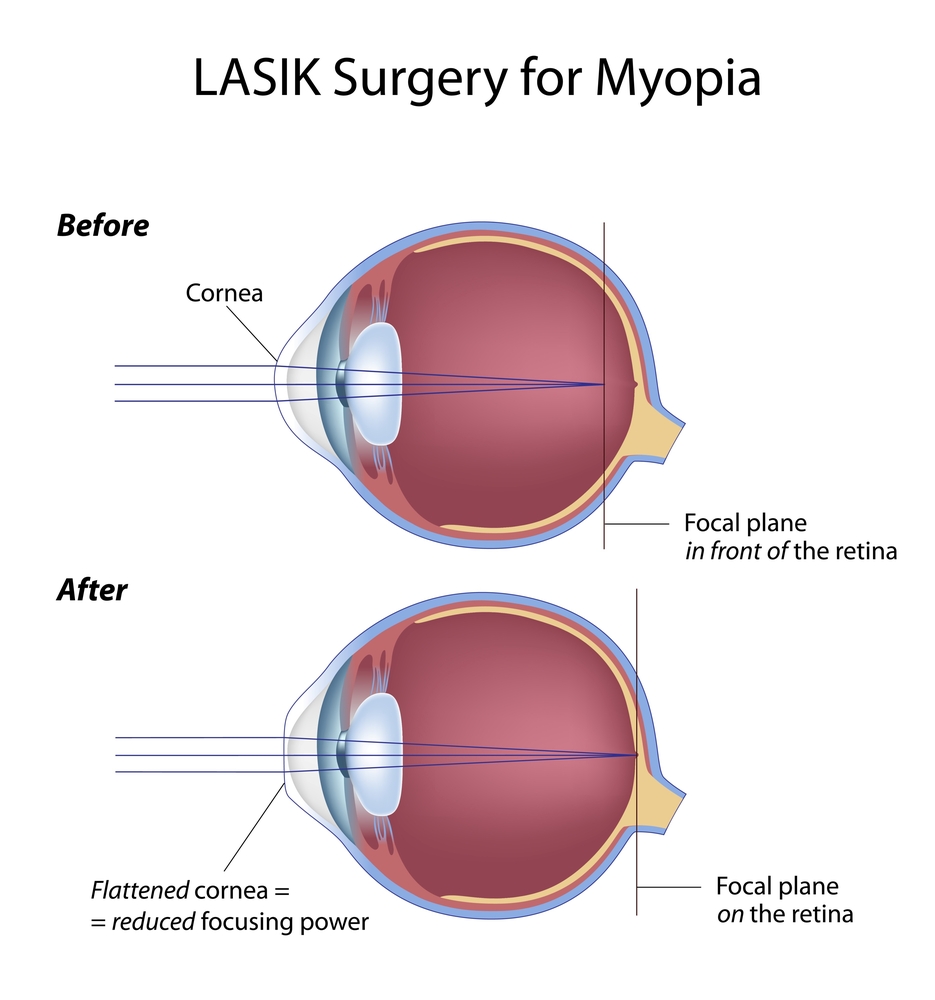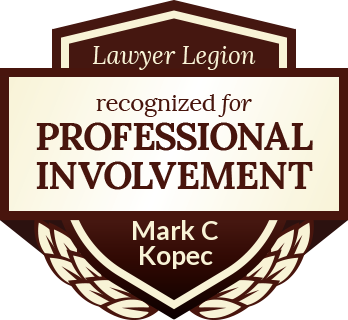Mark Kopec Now
Eye Surgery
Common Eye Surgeries – Risks and Outcomes – Eye Surgery Lawyer
Our eyes are the windows to the world, seeing the beauty and details of our surroundings. When vision problems arise, there are different surgeries and procedures that are available. Unfortunately, if they do not go well, they can significantly impact our daily lives, hurting our ability to work, drive, read, and live in this world with confidence. Let’s delve deeper into some of the most common eye surgeries, specifically looking at the symptoms they address, the underlying conditions, the details of each procedure, and possible outcomes. If you have an injury from an eyer surgery, it may be a surgical error that is medical malpractice. You should then consult with the Maryland eye surgery lawyer at The Kopec Law Firm.
1. Refractive Surgery

- Symptoms: Blurry vision at near or far distances, constant dependence on eyeglasses or contact lenses for clear vision.
- Condition: Refractive surgery corrects refractive errors., which are imperfections in the shape of the cornea or lens that prevent light from focusing properly on the retina., resulting in blurry vision. Common refractive errors specifically include nearsightedness (myopia), farsightedness (hyperopia), and astigmatism.
- Surgical Options: LASIK (Laser-assisted in situ keratomileusis) and PRK (photorefractive keratectomy) are the two most popular procedures for refractive surgery. Both utilize lasers to reshape the cornea and improve focusing ability.
- Procedure Details: LASIK involves creating a thin corneal flap using a femtosecond laser. The underlying corneal tissue is then reshaped with another laser to correct the specific refractive error. The flap is then repositioned and heals naturally. PRK, on the other hand, removes the outer layer of the cornea (epithelium) before applying the laser ablation. The epithelium regenerates naturally over several days.
- Who Performs It: An ophthalmologist, a medical doctor specializing in eye care and surgery, performs both LASIK and PRK procedures.
- Risks and Outcomes: Dry eyes, temporary fluctuations in vision, and halos around lights specifically are potential side effects. PRK has a longer recovery time due to epithelial regeneration but can be a alternative for patients with thin corneas who are not candidates for LASIK. Get your free consultation with the Maryland eye surgery lawyer at the Kopec Law Firm to discuss your specific refractive surgery case.
2. Cataract Eye Surgery
- Symptoms: Gradual clouding or blurring of vision, increased sensitivity to light and glare, difficulty seeing clearly at night, frequent changes in eyeglass prescription.
- Condition: Cataracts are a clouding of the natural lens of the eye, a common age-related condition. The lens is responsible for focusing light onto the retina, and as it clouds, consequently vision deteriorates.
- Surgery: Cataract surgery involves removing the cloudy lens and replacing it with an artificial intraocular lens (IOL).
- Procedure Details: Performed under local anesthesia, the surgeon makes a tiny incision in the cornea. Using ultrasound technology, the cataract is broken up into fragments and then removed through aspiration. Finally, the IOL is carefully inserted into the emptied lens capsule. Modern IOLs come in various types, offering features like correcting astigmatism or providing near vision focus to reduce dependence on reading glasses.
- Who Performs It: An ophthalmologist with expertise in cataract surgery performs the procedure.
- Risks and Outcomes: Potential complications include infection, bleeding, and retinal detachment. The Maryland eye surgery lawyer at the Kopec Law Firm can advise you on your specific cataract surgery injury.
3. Corneal Transplant
- Symptoms: Severe vision loss, pain, cloudy or scarred cornea, sensitivity to light.
- Condition: A corneal transplant is a surgical procedure performed to replace a damaged or diseased cornea with healthy donor tissue. The cornea is the clear dome-shaped surface at the front of the eye, responsible for focusing light entering the eye.
- Surgical Options: There are different types of corneal transplants depending on the specific layer of the cornea that is affected. For full-thickness corneal damage, a penetrating keratoplasty replaces the entire cornea. Lamellar keratoplasty techniques like DALK (deep anterior lamellar keratoplasty) or DMEK (Descemet’s membrane endothelial keratoplasty) replace only the specific affected layers while preserving healthy corneal tissue.
- Procedure Details: The surgery requires general anesthesia. The surgeon must carefully remove the damaged corneal tissue and suture the donor cornea into place. Stitches may be dissolvable or require removal after a period of healing.
- Who Performs It: An ophthalmologist specializing in corneal surgery performs the transplant.
- Risks and Outcomes: Rejection of the donor tissue, infection, and glaucoma are potential complications. The Maryland eye surgery lawyer at the Kopec Law Firm can advise you on your cornea transplant injury.
4. Retinal Surgery
- Symptoms: Sudden vision loss, flashes of light, floaters (seeing dark spots or cobwebs in your vision), distorted or wavy vision, curtain-like obscuration in your field of vision.
- Condition: Retinal surgery addresses various problems affecting the retina, the light-sensitive layer at the back of the eye responsible for converting light into electrical signals transmitted to the brain. Common conditions requiring retinal surgery include retinal detachment, macular degeneration, and vitreous bleeding.
- Surgical Options: The type of surgery depends on the specific retinal issue. Vitrectomy involves removing the vitreous gel, a clear jelly-like substance that fills the center of the eye. This may be necessary for treating vitreous bleeding or to improve access to the retina for other procedures. Retinal detachment repair can involve using lasers to create small burns around the tear, internal buckling with a scleral buckle (a band placed around the outside of the eye) to support the retina, or injecting gas or oil into the vitreous cavity to tamponade the detached retina.
- Procedure Details: Retinal surgeries can be performed with various techniques depending on the specific condition. Some procedures may utilize lasers for precise treatment, while others involve microsurgical instruments for delicate manipulations within the eye. General or local anesthesia may be used depending on the complexity of the surgery.
- Who Performs It: A retinal specialist, a subspecialty of ophthalmology with further training in diagnosing and treating retinal diseases, performs these intricate surgeries.
- Risks and Outcomes: Bleeding, infection, and further vision loss are potential complications. Early diagnosis and intervention are crucial for getting the best outcomes. You can discuss your retinal surgery injury with the Maryland eye surgery lawyer at the Kopec Law Firm.
5. Strabismus Surgery
- Symptoms: Crossed eyes (esotropia) or outward-turning eyes (exotropia), double vision, difficulty focusing, poor depth perception.
- Condition: Strabismus, also known as squint, is a condition where the eyes are misaligned and do not move together in coordination. This can cause vision problems and affect a child’s visual development.
- Surgery: Strabismus surgery aims to improve eye alignment by adjusting the muscles that control eye movement. The surgeon weakens or strengthens specific muscles to achieve a more coordinated eye position.
- Procedure Details: Performed under general anesthesia, the surgeon accesses the eye muscles through small incisions and adjusts their tension or position with sutures. As a result, this allows for more precise control of eye movement.
- Who Performs It: An ophthalmologist specializing in strabismus performs the surgery.
- Risks and Outcomes: Undercorrection, overcorrection, and recurrence of the misalignment are potential complications. Early intervention, especially in children, is crucial for optimal visual development and preventing amblyopia (lazy eye).
Next Step: Call the Maryland Eye Surgery Lawyer
Eye surgery has evolved to offer new possibilities for returning vision and making it better. Early diagnosis and intervention are often key to successful outcomes. Unfortunately, with these new procedures also come bad outcomes. Doctors may fail to diagnose conditions timely or may perform surgeries that leave you with an injury.
If you are experiencing eye problems as a result of these surgeries, visit the free consultation page or video. Then contact the Kopec Law Firm at 800-604-0704 to speak directly with Attorney Mark Kopec. He is a top-rated Baltimore medical malpractice lawyer. The Kopec Law Firm is in Baltimore and pursues cases throughout Maryland and Washington, D.C.





